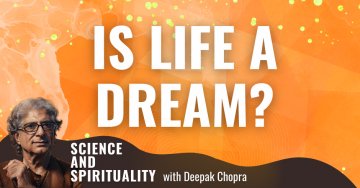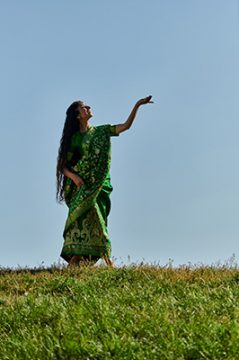Is Life A Dream?.

In today’s episode, Deepak Chopra explores the profound idea that life as we know it may be an illusion. Listen in as we explore Eastern wisdom traditions and their perspective on the dreamlike nature of reality. Learn about “pure consciousness,” the true Self, and how to awaken from the dream through meditation and self-inquiry.
Key topics:
- How various spiritual traditions like Buddhism and Vedanta view our waking state as a temporary and ever-changing projection of consciousness, similar to a dream.
- The concept of “pure consciousness” as the unchanging reality underlying all temporary states of experience.
- The importance of meditation and self-inquiry to directly experience this reality.
How understanding this perspective can challenge our conventional understanding of ourselves and the world.
Listen to the podcast here
Is Life A Dream?
Exploring Consciousness And Reality
Our Life Is A Dream
When I was growing up in India when I was 5 or 6 years old, my part-time nanny and my mother also would sing this verse, “Row, row, row your boat gently down the stream, merrily, merrily, merrily, merrily, life is but a dream.” Many years later, I came across the statement of the Buddha, “This lifetime of ours is as transient as autumn clouds. To watch the birth and death of beings is like looking at a dance. A lifetime is like a flash of lightning in the sky, rushing by, like a torrent down a mountain stream.” Much later, I came across the statement by Wittgenstein, “We are asleep. Our life is a dream, but once in a while, we wake up enough to know that we are dreaming.”
While most people think of these as beautiful philosophical statements, at the ripe age of 77 years-plus in the 4th quarter of my life, as I look back upon my days but also my entire lifetime, I see it has passed by like a dream. These are not philosophical statements. These are statements of reality. Reality has been explored practically in the Eastern traditions of yoga, Vedanta, Buddhism, and many other wisdom traditions.
The dream-like nature of the waking state is the physical world of a lucid dream because it is impermanent, transient, and ever-changing as objects and experiences in a dream seem real when you’re dreaming but vanish upon waking. The physical world may be seen as a projection of consciousness subject to change and disillusion. That physical world includes your body.

Consciousness And Reality: “The physical world may be seen as a projection of consciousness, subject to change and dissolution.”
The Waking State
It’s very important to grasp that the waking state is a vivid now and ever-present awareness. The vivid now of the waking state with its sensory projections and mental activity is temporary. It’s a temporary and ceaseless fluctuation within an ever-present changeless awareness. This awareness is linked to the spaciousness, the vastness, and the incomprehensible timeless stillness that remains even when the dream context changes.
What does it mean to wake up to reality? In Eastern wisdom traditions, it’s very practical waking up as the Buddha’s last words were. When Ananda asked him, “Are you a prophet? Are you a messiah? Are you God?” The Buddha said no to all of them. Ananda said, “You’ve got to tell me who you are and what you are before you pass on.” The Buddha’s last words were awake.
Tweet: “The waking state is a Vivid Now and an ever-present awareness.”
What does awakening mean? Awakening or liberation arises from the recognition and the experience that this deeper reality or this unchanging awareness behind all temporary states like waking, dreaming, and deep sleep is like waking up from the dream of your physical world and realizing your true nature as pure consciousness.
If you read philosophical works, then different traditions emphasize different aspects of this core understanding. Vedanta focuses on the oneness of Atman, the individual self, and Brahman, the ultimate reality or cosmic self. While Buddhism emphasizes the impermanence of all phenomena and the liberation of suffering through detachment, it doesn’t mean you don’t enjoy the movie. You enjoy the movie even more because you are fully present as the witnessing awareness, the presence within the movie. Also, yoga offers practices to connect with the subtle body and eventually with pure consciousness, which is pure knowing.

Consciousness And Reality: “Yoga offers practices to connect with the subtle body and eventually with pure consciousness, which is pure knowing.”
While these ideas are described intellectually by me, a true understanding is only going to rise from direct experience through meditation, self-inquiry, and other practices. This perspective doesn’t necessarily mean negating the physical world’s existence or practicality. The physical world’s existence is experienced only intermittently, but every time, its experience is different.
When I experience my body now, it’s a different body than from yesterday. It has the basic archetype, but when I experience this body now, it’s different from yesterday, a few hours ago, or even a few moments ago. It’s ceaselessly transforming. It appears intermittently because when I’m asleep in a deep sleep or dream state, there’s no experience of body. The experience of body is intermittent and changing, and yet, it is very convincing even though it’s a lucid dream in a vivid now.
We can experience the physical reality, the body, in this world as a changing mental activity, which in itself is a fluctuation of a non-changing awareness, but ultimately, if we want to find liberation, then we have to understand that this is a very provisional identity as is the physical world. It’s provisional as a fluctuating perceptual and mental activity in a tributary or a branch of pure consciousness, which has infinite modes of knowing.
This perspective will challenge your conventional understanding of reality. Examine it and then try and experience it through taking a stand as witnessing awareness in waking, sleeping, and dreaming, but particularly in waking because the waking set is the most convincing aspect of the lucid dream in the vivid now.
Pure Knowing
When you get this in the beginning, it will be a glimpse into a vast and complex understanding of reality. That vast and complex understanding of reality can only come through many kinds of practice, like Rāja yoga, which is the eight limbs of yoga, Bhakti yoga, the yoga of love and devotion, and Karma yoga, the yoga of service. All these expand our identity from being squeezed into the volume of a body and the span of a lifetime.
The body itself is part of the dream. One has to understand this. You as the essence of all existence are pure knowing, and then everything experienced in existence is a modified knowing. The knowing that we call seeing gives rise to form and phenomena. The knowing that we call hearing gives rise to the phenomena that we call sound. The knowing that we call tasting and sensing gives rise to the phenomena that we call sensation. The knowing of the experience that we call flavor is tasting, which is a mode of knowing. Smelling is a mode of knowing. Thinking is a mode of knowing. Feeling and emotions are a mode of knowing. Imagination is a mode of knowing.
These modes of knowing, in your case and my case, are within a certain range only. Other species have their own modes of knowing, like bats, insects, and species with multiple eyes and organs that have different sensory access to information and different motor activities. You can see there are innumerable modes of knowing. All of them give us a fragmented view of reality or a fragmented perspective of reality. None of them are absolute. All of them are provisional.
Therefore, while you experience modes of knowing, your essential nature when you trace it back to its source is pure knowing. That’s what our spirit is. Our spirit, our consciousness, and our awareness, the essence of that is pure knowing. The universe with all its diversity of experience through innumerable species, that is all infinite modes of knowing.
Tweet: “The goal of existence is to know yourself as the immeasurable potential of all that was, all that is, and all that will ever be.”
What is known is infinite experiences. That is the differentiation of pure consciousness into our experience of space, time, energy, and matter as well, but that’s not who we are. We are not the experience. We are not even the modes of knowing of the experience. We are the pure knowing which differentiated the experience it caused. If we really understand this, this gives us access to unlimited modes of knowing by going back to the source through intention and attention.
These are the last three limbs of yoga, dharana, subtle intention but focused, dhyana, the meditation process that takes us to the source, and samadhi, the journey to pure consciousness. I’m going to be offering a course on this very soon as well based on the chapter by Patanjali which deals with the Siddhis or supernormal abilities which are dormant potentials in our non-local self. We have access to these supernormal abilities as well. Not that that’s the goal of existence, but the goal of existence is to know yourself as the immeasurable potential of all that was, all that is, and all that will ever be. Let me know if I should continue these short explorations in the direction of reality with you.

